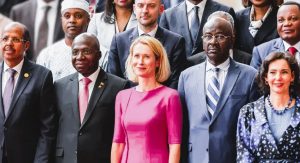Nigerian atheist freed from prison but fears for his life
4 min readA prominent Nigerian atheist, Mubarak Bala, has been released after spending over four years in prison for blasphemy. Following his release, Bala is now living in a safe house, as his legal team fears for his safety. The 40-year-old was convicted in Kano, a city in northern Nigeria, after pleading guilty to 18 charges related to a Facebook post he shared in 2020 that sparked controversy. Despite his newfound freedom, Bala expressed concern for his life, highlighting that the fear of potential harm remains ever-present.
In an exclusive interview with the BBC, Bala admitted that he constantly feared for his safety during his time in prison. “The concern about my safety is always there,” he shared as he enjoyed his first meal as a free man. Nigeria is a deeply religious country where both Islam and Christianity are highly revered, and those perceived to insult or challenge these religions often face discrimination or worse. Blasphemy is considered an offense under Sharia law, which operates in 12 northern states, as well as Nigeria’s secular criminal law.
Bala, who publicly renounced Islam in 2014, spent much of his time behind bars feeling like he “may not get out alive.” His fear was heightened by the possibility of being targeted by guards or fellow inmates, particularly in the first prison he was sent to in Kano, a predominantly Muslim city. Despite his release, Bala described the underlying threat that still looms over him. “Freedom is here, but also there is an underlying threat I now have to face,” he said. “All those years, those threats, maybe they’re out there.”
Bala’s sentence could have been much longer had an appeals court judge not reduced the original 24-year sentence, which was deemed excessive. The court’s decision to lower the sentence last year brought a glimmer of hope, as it provided some relief from the lengthy prison term he was initially facing.
When Bala walked out of prison in the Nigerian capital, Abuja, he looked exhausted but happy, dressed in a white T-shirt, khaki shorts, and flip-flops. He emerged from the prison with his lawyer, beaming as he adjusted to his freedom. “Everything is new to me. Everything is new,” he said, reflecting on the new life ahead of him.
Bala’s arrest was triggered by a complaint filed by a group of lawyers over his controversial social media post. He spent two years in prison awaiting trial before being convicted in 2022. His unexpected guilty plea confused many, including his legal team, but Bala justified his decision, explaining that it alleviated the pressure on those who had supported him, such as his lawyers, friends, and family. “I believe what I did saved not only my life, but people in Kano,” he remarked. “Especially those that were attached to my case, because they are also a target.”
His conviction was met with widespread condemnation from international human rights organizations, raising concerns about freedom of speech in Nigeria. The case also sent shockwaves through the country’s small atheist and humanist communities, with many activists viewing his release as a bittersweet moment. While some expressed relief at his freedom, others are still troubled by the stigma attached to his imprisonment.
“It’s thanks and no thanks,” said Leo Igwe, the founder of the Humanist Association of Nigeria. “Thanks, that he’s out, thanks that he’s a free man. But no thanks, because there is a dent on him as if he committed a crime. For us at the Humanist Association, he committed no crime.” Igwe’s statement reflects the complex emotions surrounding Bala’s release and the challenges faced by non-religious individuals in Nigeria.
Bala, for his part, is eager to reconnect with his family, including his young son, who was only six weeks old when he was imprisoned. Despite the hardships he endured, he expressed no regrets about his activism or his decision to share his views on social media. “My activism, my posting on social media, I always knew the worst would happen. When I made the decision to come out, I knew I could be killed. I knew the dangers, and I still decided to do it,” he said.
Although Mubarak Bala has regained his freedom, the scars of his imprisonment and the ongoing threats to his safety serve as stark reminders of the dangers faced by individuals who challenge religious norms in Nigeria. His case has become a symbol of the broader struggle for freedom of expression and the rights of non-believers in a country where religious intolerance can lead to severe consequences. As Bala seeks to rebuild his life, his future remains uncertain, and the threat of violence continues to overshadow his newfound liberty.






